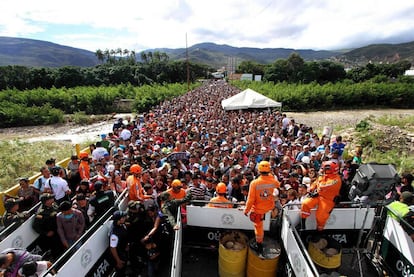Venezuela opens border crossing with Colombia for second weekend in a row
Authorities expect most of the 90,000 people who made the journey on Sunday to return home

The estimated 90,000 Venezuelans pouring across the Simón Bolivar bridge into Colombia on Sunday greeted border guards with heartfelt thanks, many in tears as they took advantage of Venezuela’s decision to reopen the frontier for a second weekend in a row with its neighbor from 6am to 11pm to allow people to buy food, medicines and other basic goods in short supply in their country. Over the course of the weekend some 140,000 Venezuelans crossed the bridge from San Antonio del Tachira into the Colombian town of Cúcuta.
Last week, after the border was opened briefly, there were similar scenes as thousands of desperate people stormed into Colombian supermarkets, highlighting the ever-worsening situation in Venezuela, where the economy has been in a freefall since the 2014 crash in oil prices.
Venezuelan President Nicolas Maduro blames the shortages of food, medicine and basic staples in in his country on opponents trying to create economic chaos to oust him from office. His critics accuse his socialist government of economic mismanagement.
Venezuela’s economy has been in a freefall since the 2014 crash in oil prices
Colombian immigration officials say most Venezuelans making the crossing return home, but are taking measures to prevent illegal migration.
“A police unit has been deployed to control those people who have tried to travel to the interior,” says Humberto Velázquez, a Colombian immigration official. “And we work with the authorities through a data system to study each case.”
In August of last year, President Maduro ordered the 2,219 kilometer border shut to crack down on criminal gangs smuggling goods and gasoline over the border to be sold.
Before it was closed, more than 100,000 people daily used the two main crossings, according to the Venezuelan government. That has shrunk to just 3,000 a day, many of them students and sick people given special day passes, nonprofit groups working in the region say.
“We have to look closely at how those who return behave and how we handle them,” says Víctor Bautista, border security affairs chief at the Colombian Foreign Ministry. Colombia says it has received many petitions from Venezuelans who want to remain in the country for more than one day to visit family. “This is an area many Colombians and Venezuelans crossed every day to go to work, school or visit family members,” Bautista added.
Sign up for our newsletter
EL PAÍS English Edition has launched a weekly newsletter. Sign up today to receive a selection of our best stories in your inbox every Saturday morning. For full details about how to subscribe, click here
By 6pm, about 70% of the Venezuelans who crossed the frontier on Sunday had returned. Colombian authorities relaxed border security regulations until 11 pm. After that time, Venezuelan travelers must show a passport and proof of economic means to support themselves while traveling in Colombia.
Colombian Foreign Minister María Ángela Holguín is expected to travel to Cúcuta on Monday where she will meet with local officials to evaluate their working plan for opening the border during extraordinary periods and, if necessary, adjust the date of her meeting with her Venezuelan counterpart, Delcy Rodriguez. The meeting is set to take place on August 4.
Despite the pressure on Cúcuta, Colombia has not declared a humanitarian crisis at its border with Venezuela. “With the record number of arrivals, we are creating surveys to assess the reasons why Venezuelans come to our country,” Bautista said.
English version by Dyane Jean-François.
Tu suscripción se está usando en otro dispositivo
¿Quieres añadir otro usuario a tu suscripción?
Si continúas leyendo en este dispositivo, no se podrá leer en el otro.
FlechaTu suscripción se está usando en otro dispositivo y solo puedes acceder a EL PAÍS desde un dispositivo a la vez.
Si quieres compartir tu cuenta, cambia tu suscripción a la modalidad Premium, así podrás añadir otro usuario. Cada uno accederá con su propia cuenta de email, lo que os permitirá personalizar vuestra experiencia en EL PAÍS.
¿Tienes una suscripción de empresa? Accede aquí para contratar más cuentas.
En el caso de no saber quién está usando tu cuenta, te recomendamos cambiar tu contraseña aquí.
Si decides continuar compartiendo tu cuenta, este mensaje se mostrará en tu dispositivo y en el de la otra persona que está usando tu cuenta de forma indefinida, afectando a tu experiencia de lectura. Puedes consultar aquí los términos y condiciones de la suscripción digital.









































